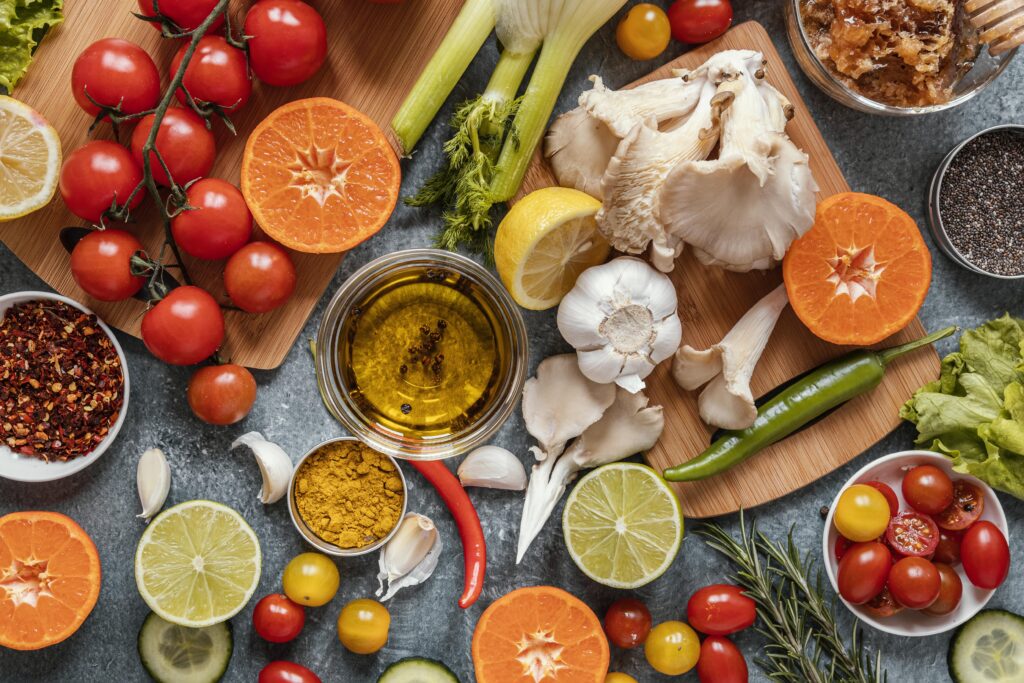
Does it seem like lots of folks are talking about “anti-inflammatory” diets lately? I agree! From social media to top-tier news outlets, health “influencers” to nutrition professionals; they’re telling us that eating certain foods can help reduce chronic inflammation. So what’s all the fuss about? Here are the basics of this style of eating, its potential health benefits, and what foods to focus on.
What chronic inflammation is (and isn’t)
Inflammation is a natural response in our bodies, and it shows up in two main ways:
- Acute inflammation is a protective measure that our bodies employ to fight off invading organisms, allergens, or toxic chemicals. It also helps repair an injury such as a cut or sprain. The body’s immune system is in charge of this response. To help the body start healing, it sends inflammatory cells to the location of the injury or infection. You can often tell this is happening because your injury will get red and tender or swollen. Or your body may develop a fever when you’re fighting a virus. Once the problem is addressed, the immune system settles back down.
- Chronic inflammation is the result of an immune response that doesn’t settle down. Even when there is no invader, your body continues to send inflammatory cells, and this constant inflammatory response can damage healthy cells. It can also lead to autoimmune diseases such as lupus, thyroid diseases, or rheumatoid arthritis, to name a few. Sometimes called “low-grade” inflammation, chronic inflammation can occur throughout the body in reaction to lifestyle habits too. Examples include excessive alcohol consumption, smoking, chronic stress, and over-exercising. Carrying a high amount of adipose tissue around the belly is also a factor. Over time, chronic inflammation can lead to diseases like heart disease, Alzheimer’s disease, certain cancers, and type 2 diabetes.
How does an anti-inflammatory diet help?
Over time, our diets can contribute to chronic inflammation if we’re not careful. Sugary foods and drinks, highly processed foods, and foods high in saturated fats are key culprits. On the other hand, a diet that is nutrient-dense and fiber-rich helps our body in numerous ways. Perhaps most importantly, it provides healthful compounds that our bodies need to keep all our systems running well.
The mechanisms by which a healthy diet fights inflammation are complicated and varied. In general, however, an anti-inflammatory diet:
- tends to calm the body’s low-grade immune response
- inhibits metabolic pathways that pave the way toward chronic diseases
- results in decreased blood markers for inflammation
Our immune system can’t be “boosted” per se, but we can support it through healthy eating. An anti-inflammatory diet is a good way to do that. But how much difference will it make on an individual’s inflammation level or chances of getting a chronic disease? The honest answer: we don’t know for sure. However, here’s a 2016 study that showed promising results. It followed people with type 2 diabetes for one year. Some followed an anti-inflammatory diet, while others followed a low-fat diet with no emphasis on anti-inflammatory foods. The anti-inflammatory dieters had a 37% decrease in C-reactive protein (a marker for chronic inflammation found in the blood). In contrast, those who did not follow an anti-inflammatory diet experienced no change in this protein.
What is an anti-inflammatory diet?
An anti-inflammatory diet might more accurately be called an eating style. In general, an anti-inflammatory eating pattern will tend to:
- contain a variety of nutrients
- be rich in fiber
- have plenty of beneficial plant compounds, like antioxidants
- contain little to no added sugar
- have little to no saturated fat, but may be rich in healthy fats
Plant-forward eating is increasingly being recognized as anti-inflammatory. This is partly due to its influence on the gut microbiome (the bacteria that reside in the intestinal tract). To learn more about moving toward a plant-based diet, check out this previous post. There is room for certain animal foods in an anti-inflammatory diet, although red meat and processed meats aren’t recommended. If you’re looking for more direction, consider the DASH Diet or the Mediterranean Diet. There’s also the MIND Diet (sort of a combo of both the DASH and Mediterranean diets). All of these follow an anti-inflammatory diet pattern.
Which foods are anti-inflammatory?
As you can see by the list below, fruits and vegetables figure prominently in an anti-inflammatory diet. High in antioxidants and other beneficial plant compounds, fruits and vegetables can be your best go-tos. Omega-3 fat sources like fatty fish, olive oil, certain nuts and seeds, and even omega-3-enriched eggs are also encouraged. Probiotic foods are important to nourish the gut microbiome. And for additional fiber, whole grains round out the list of basic anti-inflammatory foods.
- Berries
- Dark green leafy vegetables
- Citrus fruits
- Tomatoes
- Beans (pinto, black, kidney, etc.)
- Seeds and tree nuts
- Whole grains
- Eggs (including those with omega-3 fatty acids)
- Fatty fish like salmon, sardines, and tuna
- Extra virgin olive oil
- Fermented foods with live probiotics (yogurt, kimchi, kombucha)
- Herbs and spices (garlic, ginger, turmeric)
- Dark chocolate (70% cacao or higher) and cocoa powder
- Green tea, herbal tea
Don’t get lost while shopping for nutritious options. Just follow the stars. Learn more.